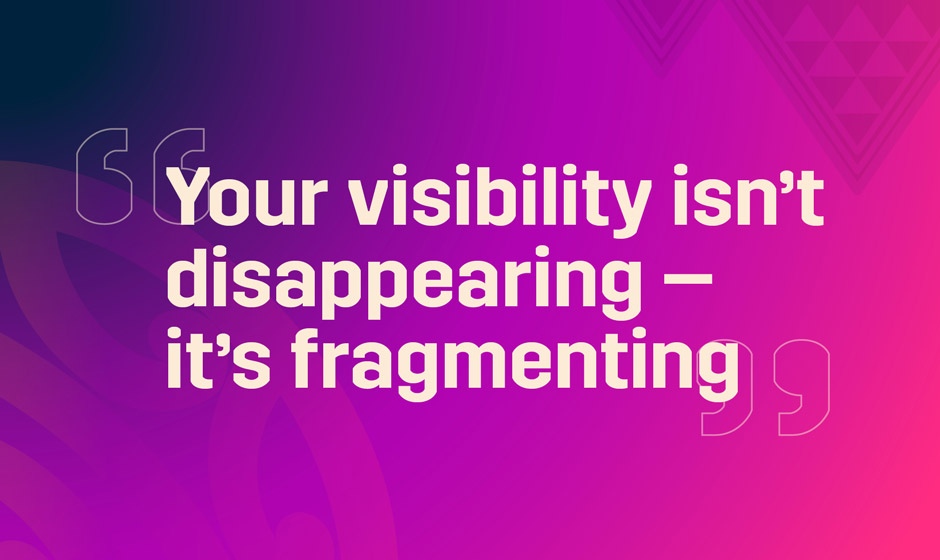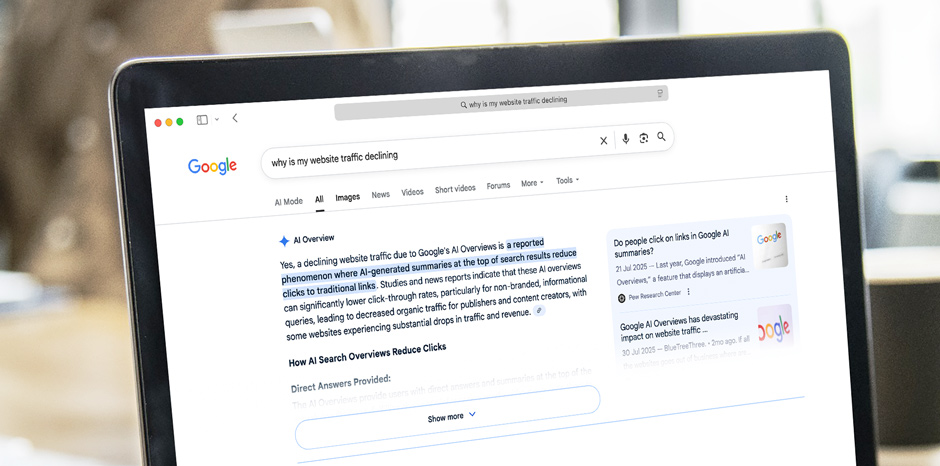Craig Adolph, Head of Digital and Jack Little, Media and Digital Specialist – Hemisphere

A practical guide for business leaders navigating the biggest shift in search since Google launched.
If you run a business or manage marketing for one, you've probably noticed something unsettling: your analytics don't look like they used to.
Or maybe your team is talking about "GEO" (Generative Engine Optimisation — nothing to do with location!) and "AI Overviews," and you're wondering whether to panic, pivot, or ignore the hype.
You're right to be concerned. But you don't need to panic.
We're Craig and Jack from Hemisphere, and we work with New Zealand businesses facing exactly this challenge.
The search landscape is changing faster than at any point since Google launched in 1998. But unlike the Search Engine Optimisation (SEO) agencies selling you expensive "revolutionary GEO courses," we're here to give you a straightforward assessment of what's actually happening and what you should do about it.
What's keeping you up at night (and why you're not imagining it)
Let's start with the uncomfortable facts:
Your organic traffic is probably declining, even if you're doing everything right. People click your links 30% less often since May 2024. When Google's AI Overviews appear (which is now 42% of the time), people get their answers without clicking your website.
Your competitors are just as confused as you are. The difference is, some are acting on incomplete information while others are frozen, waiting for clarity that isn't coming.
The "experts" are selling hot air. Most GEO advice right now is just basic content principles repackaged with new acronyms and sold at premium prices.
Google's dominance in New Zealand means you can't ignore this. When Google changes, your business feels it immediately.
The question you're really asking
What we hear from business leaders is: "Should I invest in this new AI search optimisation thing, or is it just the latest marketing fad?"
The honest answer: it's neither a fad nor a completely new discipline. It's an evolution. And, like all evolutions, ignoring it isn't an option, but overreacting wastes money.
Think about it this way: when mobile search exploded, you didn't throw out your entire digital strategy. You adapted it. The same principle applies here.
What's actually changing (the version without the buzzwords)
People are still searching. In fact, search volume is growing. But they're getting answers in different places:
Your visibility isn't disappearing — it's fragmenting. Instead of one ranking to worry about, you now need to show up across multiple AI platforms. The good news? Strong traditional SEO still predicts strong AI visibility. Sites ranking in the top three positions are twice as likely to appear in AI Overviews.
Commerce is moving into conversations. ChatGPT now processes 700 million users weekly, and they can research and buy products without ever visiting a website. If you're in e-commerce and your strategy assumes people will browse your site before purchasing, that assumption is already outdated.
Zero-click searches aren't all bad. Yes, they've grown from 56% to 69% in just one year. But when your brand gets cited as the source, you're building awareness even without the click. And when people do click from an AI citation, they're often further along in their buying journey.

Here's our framework (and why it works)
At Hemisphere, we use what we call the Integrated Search Framework. It's built on a simple premise: the fundamentals of good marketing haven't changed, but the distribution channels have multiplied.
Layer 1: Know What They're Asking
We don't guess what people want — we find out the real questions they have. We listen to what they ask in calls and what they search for online. This helps us know exactly what problems they need you to solve.
Layer 2: Be the Answer
Now that we know the questions, we write the clearest, best answers on the internet. We make your information so trustworthy and well-written that powerful AI tools (like Google's search boxes) will actually show your business as the expert. This helps you "win" the zero-click search, meaning people see your brand as the right answer, even before they click on your website. This step is also where we focus on what makes you special in New Zealand — like your local knowledge or understanding of tikanga Māori (Māori customs and practices). This is the stuff that overseas companies can’t know, and it makes you the most trusted local expert.
Layer 3: Provide the Best Experience
The people who finally click on your site are already serious about buying. They are the best traffic, and they arrive with higher expectations. We make sure your website is perfectly set up to meet those expectations, quickly proving you are the most trustworthy choice. This seamless experience helps turn those few, high-quality visitors into happy, paying customers.
Why Paid Search is more important now, not less
SEO and paid search are not competing priorities.
As organic click-through rates decline, paid search becomes more valuable, not less. Google's VP of Ads recently said it plainly: "Sometimes, the best answer is an ad." They're integrating ads directly into AI Overviews — positioning them as helpful information, not interruptions. Are you surprised? We're not — of course Google would do this!
Your paid campaigns should:
The businesses winning right now aren't choosing between SEO and Search Engine Marketing (SEM). They're using both in an integrated strategy that adapts to wherever their customers are looking for solutions.
What you should actually do (this month, not next year)
You need a pragmatic plan that balances immediate needs with long-term positioning. Here's ours:
Short term (next 90 days):
Medium term (next 6 months):
Long term (ongoing):
What success actually looks like
You need to be realistic about metrics. Your traditional traffic numbers might decline even if you do everything right. That's a market reality, not a campaign failure.
The new success metrics are:
Why we're not selling you a course
We could package this as a "revolutionary GEO system" and charge you five figures for access. That's what a lot of agencies are doing right now.
Instead, we're telling you this: the fundamentals work. Quality content for real people. Strong technical SEO. Trusted expertise. Clear communication. These haven't changed.
What's changed is the distribution. And that's where most businesses need help — not learning new tactics, but adapting proven principles to new platforms while staying ahead of rapid market shifts.
Your decision point
You're at a crossroads. You can:
The businesses thriving through this transition aren't the ones with the biggest budgets. They're the ones with clear strategies that balance immediate needs with long-term positioning.
Let's talk about your specific situation
Every business faces different AI search challenges:
At Hemisphere, we help New Zealand businesses navigate this transition with our balanced approach — combining data-driven insights with creative problem-solving. We don't sell courses. We don't promise overnight transformations. We build integrated search strategies that work across SEO, GEO, and SEM to drive actual business outcomes.
Ready to understand what this means for your specific business? Let's kōrero. We'll assess where your AI search risks and opportunities are, and give you a practical roadmap — not a sales pitch for "revolutionary" tactics you don't need.
Craig Adolph is Head of Digital at Hemisphere, leading regional expansion and digital transformation initiatives. Jack Little is a Media and Digital Specialist focused on integrated search and social strategies. Together, they help New Zealand businesses cut through the noise and build search strategies that drive measurable growth.